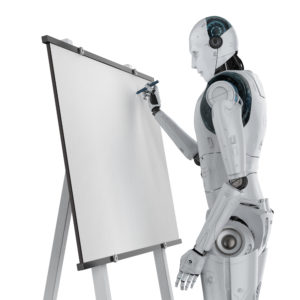
A recent news update on our website reported that the Canadian Intellectual Property Office (CIPO) has recently issued a copyright registration where one of the (two) authors named for the work is an artificial intelligence (AI) program. This raises the question of how well (if at all) the Copyright Act[i] (the “Act”) is equipped to deal with non-human authorship of works.
As a starting point, the term “author” is not defined in the Act. However, several provisions in the Act strongly suggest that an author must be a natural person. For example, the Act provides that the term of copyright is the life of the author plus fifty years[ii]. Obviously, where the author is not a natural person, it would be impossible to determine this term. Even in the case of joint authors where only one of the authors is not a natural person (such as in the copyright registration recently issued), problems arise. For works of joint authorship, the term of copyright lasts until fifty years after the last author dies[iii]. Given that software can presumably last indefinitely, perhaps naming an AI program as a co-author would be a creative way to indefinitely extend the length of copyright in a work?
The Federal Court of Appeal has also dealt with this issue, albeit not directly. In P.S. Knight Co. Ltd. v. Canadian Standards Association[iv], the Court was addressing one of the presumptions in the Act (section 34.1.(2)(a)) relating to authorship, namely that if a name purporting to be that of the author is printed in the usual manner, that person would be presumed to be the author. The Court held that the Canadian Standards Association (CSA) was not entitled to the presumption:
“The term “author” is not defined in the Copyright Act, but it undoubtedly refers to a natural person. Copyright subsists for “the life of the author, the remainder of the calendar year in which the author dies, and a period of fifty years following the end of that year”: Copyright Act, s. 6 [emphasis added]. As a corporation, capable of only metaphorical life and death, the CSA cannot benefit from the presumption in paragraph 34.1(1)(a) of the Copyright Act.”
Although the Court was only addressing whether a corporation could be considered an author, it would seem that similar considerations apply to other non-human authors, including an AI program.
Also of importance is the question of subsistence of copyright. The Act provides that copyright subsists in every “original literary, dramatic, musical and artistic work…”[v]. “Original” is not defined in the Act; however, the Supreme Court of Canada has held that an original work must be the product of an author’s exercise of skill and judgment (CCH Canadian Ltd. v. Law Society of Upper Canada[vi]). This is not necessarily a difficult bar to meet. In particular, a work need not be creative in order to qualify for copyright protection. It is an open question as whether an AI program would be able to inject the necessary “skill and judgment” a work for it to qualify for copyright protection. The concept of “judgment” is directly related to one of the objectives of AI – the ability to make decisions in a way that simulates human intelligence. As AI technology progresses, it may be difficult to differentiate between the “judgment” of a human author and that of an AI program.
One further issue has to do with moral rights. The Act provides protection for an author’s moral rights, which relate to, among other things, the author’s right to the integrity of the work. The author’s moral rights are only infringed when certain acts occur (e.g. distortion or mutilation of the work) to the prejudice of the author’s honour or reputation[vii]. For authors that are AI programs, this raises the question of when would an AI program’s honour or reputation be prejudiced? Is it even possible for a software program to have honour or reputation? Corporations are sometimes considered to least have reputations (and perhaps even honour) – it would seem plausible for AI programs to have reputations as well.
In view of some of the issues raised, the Canadian government recently conducted consultations regarding AI and its applicability to the copyright framework. It is likely that amendments to the Act will be necessary in order to adequately accommodate AI into copyright.
[i] R.S.C. 1095, c. C-42
[ii] Section 6, Copyright Act
[iii] Section 9(1), Copyright Act
[iv] 2018 FCA 222
[v] Section 5, Copyright Act
[vi] 2004 SCC 13
[vii] Section 28.2(1), Copyright Act
